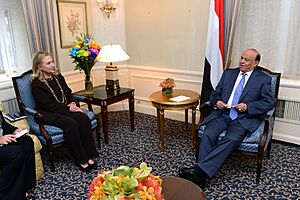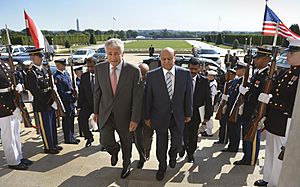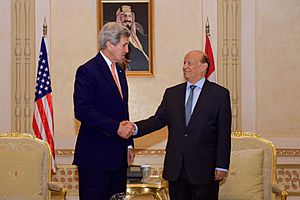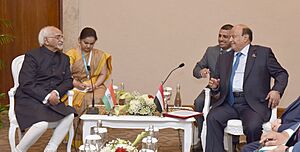Abdrabbuh Mansour Hadi facts for kids
Quick facts for kids
Abdrabbuh Mansour Hadi
|
|
|---|---|
| عبدربه منصور هادي | |
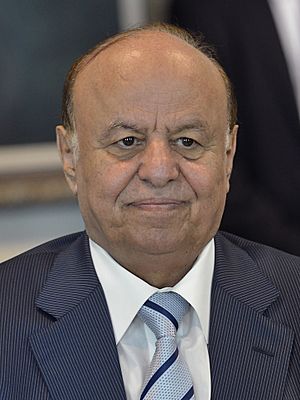
Hadi in 2013
|
|
| 2nd President of Yemen | |
| In office 25 February 2012 – 7 April 2022 Disputed from 22 January 2015 |
|
| Prime Minister |
|
| Vice President |
|
| Preceded by | Ali Abdullah Saleh |
| Succeeded by | Rashad al-Alimi (as Chairman of the Presidential Leadership Council) Abdul-Malik al-Houthi (de facto leader of Yemen) |
| Chairman of the General People's Congress | |
| In office 21 October 2015 – 7 April 2022 Disputed with Ahmed Saleh and Sadeq Amin Abu Rass |
|
| Preceded by | Ali Abdullah Saleh |
| Succeeded by | Vacant |
| Vice President of Yemen | |
| In office 3 October 1994 – 27 February 2012 |
|
| President | Ali Abdullah Saleh |
| Prime Minister |
|
| Preceded by | Ali Salem al Beidh |
| Succeeded by | Khaled Bahah |
| Defense Minister of Yemen | |
| In office 30 May 1994 – 3 October 1994 |
|
| President | Ali Abdullah Saleh |
| Prime Minister | Muhammad Said al-Attar |
| Preceded by | Haitham Qasem Taher |
| Succeeded by | Abdel Malik al-Sayani |
| Personal details | |
| Born | 1 September 1945 Thukain, Al Wade'a District, Abyan, Aden Protectorate |
| Nationality | Yemeni |
| Political party | General People's Congress |
| Military service | |
| Allegiance |
|
| Branch/service | |
| Years of service | 1964–2022 |
| Rank | Field marshal |
| Battles/wars |
|
Abdrabbuh Mansour Hadi (born 1 September 1945) is a Yemeni politician and a former military officer. He served as the second president of Yemen from 2012 until he resigned in 2022. Before becoming president, he was the second vice president of Yemen from 1994 to 2012. He served under President Ali Abdullah Saleh.
Hadi was also a field marshal in the Yemeni Armed Forces. From June to September 2011, he was the acting president of Yemen. This happened while President Ali Abdullah Saleh was getting medical treatment in Saudi Arabia. Saleh had been injured during the 2011 Yemeni uprising. In November, Hadi became acting president again. This was after Saleh stepped back from his active role.
Hadi was chosen as president for a two-year period on 21 February 2012. He was the only candidate agreed upon by Yemen's political groups. However, some groups, like the Houthis and Southern Secessionists, did not take part in the election. His time as president was extended for another year in January 2014.
On 22 January 2015, Hadi was forced to resign by the Houthis. This happened during large protests against his decision to raise fuel prices. People were also unhappy with the results of the 2011 revolution. The Houthis and Saleh's supporters took over the presidential palace. They placed Hadi under house arrest.
A month later, Hadi escaped to his hometown of Aden. He then said his resignation was not valid. He spoke out against the Houthi takeover. The next day, he arrived in Riyadh. A group of countries led by Saudi Arabia then intervened to support his government. He returned to Aden in September 2015 after Saudi-backed forces took back the city.
In 2022, Hadi stepped down from his role. He gave his power to the Presidential Leadership Council. Rashad al-Alimi became the chairman of this new council. This decision was part of a bigger effort to bring peace to Yemen's civil war.
Contents
Early Life and Military Service
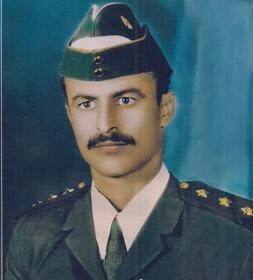
Abdrabbuh Mansour Hadi was born on 1 September 1945. His birthplace was Thukain, in the Al Wade'a District of Abyan, a southern region of Yemen. He finished military academy in the Federation of South Arabia in 1966. He also received a scholarship to study in Britain that year. However, he could not go because he did not speak English.
Hadi played a quiet role during the Aden Emergency. After South Yemen became independent, he became more important in the new military. He reached the rank of Major General.
In 1970, he received another scholarship to study armoured warfare in Egypt. Hadi then spent four years in the Soviet Union. There, he studied military leadership. He held several military jobs in the army of South Yemen until 1986. That year, he fled to North Yemen. He went with Ali Nasir Muhammad, who was the president of South Yemen. This happened after Ali Nasser's group lost the 1986 civil war.
During the 1994 civil war in Yemen, Hadi supported the Yemeni government. He sided with President Ali Abdullah Saleh. He was made Minister of Defense. In this role, he led the military actions against the Democratic Republic of Yemen. After the war, he was promoted to Vice-president on 3 October 1994. He replaced Ali Salem al-Beidh, who had resigned and fought against the government.
Becoming President of Yemen
How Hadi Became President
Hadi was the only person running in the presidential election. This election took place on 21 February 2012. Both the ruling party and the opposition parties in parliament supported him. The election officials said that 65 percent of registered voters in Yemen cast their votes. Hadi won with 100% of the votes. He took his oath of office in Yemen's parliament on 25 February 2012. He officially became the President of Yemen on 27 February 2012. This was when Saleh officially stepped down and gave power to Hadi.
Changes and Reforms
In March 2013, the National Dialogue Conference was started. This meeting was a key part of the country's transition. It aimed to bring together different groups in Yemen. They wanted to discuss important issues facing the country. In January 2014, Hadi encouraged the delegates to finish their talks. They had been stuck on some key issues. When they finally agreed on the last points, Hadi gave a powerful speech. This made him very popular.
It was decided that Yemen would change to a federal system of government. This means power would be shared more with different regions. Hadi strongly supported this idea. However, many Yemenis, especially in the poorer northwestern parts, were not happy. They worried that decentralization would mean less money from the central government. They also worried that new regional borders would cut off their access to the sea.
Military Changes
Hadi made changes to the Armed Forces of Yemen. The military had been divided since the Yemeni Revolution. In December 2012, Hadi issued a special order. This order reorganized the military into five main parts. These parts were the Air Force, Army (Ground Force), Navy and Coastal Defense, Border Troops, and Strategic Reserve Forces. The Strategic Reserve Forces replaced the old Republican Guard.
Dealing with Security Challenges
From the start of his time in office, Hadi focused on fighting Al-Qaeda. He said this was a very important goal. In a meeting with the British Foreign Secretary, William Hague, Hadi stated, "We plan to fight terrorism with full strength. We will chase it to its very last hiding place."
The Yemeni military had been very divided. This happened after Major General Ali Mohsen al-Ahmar left his post in March 2011. Protests were demanding that Hadi's predecessor, Ali Abdullah Saleh, step down. Military protests also spread to the Republican Guard in Sana'a. Soldiers closed roads and demanded changes in leadership.
In September 2012, Hadi warned that Yemen could fall into a civil war. He said it could be "worse than Afghanistan." This would happen if the national dialogue failed to fix the country's deep problems. He also said Yemen was facing "three undeclared wars." These were from al Qaeda, pirates in the Gulf of Aden, and Houthi rebels in the north. He suggested that Iran was indirectly supporting these groups.
Rebel Takeover and Civil War
Hadi had to agree to share power after the fall of Sana'a in September 2014. This happened when the Houthi group, also known as Ansar Allah, took control. These revolutionaries refused to join the "unity government." However, they continued to hold important places and areas in northern Yemen. Hadi faced more difficulties when his own political party, the General People's Congress, removed him as their leader. They also rejected his choices for cabinet members in November 2014.
The Houthis said they entered Sana'a and removed Hadi because he had extended his power beyond the agreed-upon two-year period. They also accused him of trying to avoid a power-sharing deal. They claimed they were protecting government buildings from corrupt officials.
Three days after Hadi's resignation on 21 January 2015, the Houthis took over the presidential palace. Hadi and Prime Minister Khaled Bahah offered their resignations to parliament. However, parliament reportedly did not accept them. The Yemeni cabinet was then dissolved. Hadi and his former ministers remained under house arrest.
United Nations Secretary-General Ban Ki-moon asked for Hadi to be put back in power. This was after the Houthis set up their own interim government in February 2015. However, Houthi-controlled media reported that Hadi confirmed his resignation was final.
But after leaving Sana'a and going to his hometown of Aden on 21 February, Hadi said the Houthis' actions were against the law. He declared them invalid.
On 26 March 2015, Saudi state TV reported that Hadi arrived in Riyadh. He was met by Saudi Defense Minister Mohammad bin Salman Al Saud. This happened as Saudi Arabia and its allies began airstrikes in Yemen against the Houthis. This was part of the 2015 military intervention in Yemen.
In March 2017, a court in Houthi-controlled Sana'a sentenced Hadi and six other officials to death. This was done in their absence for "high treason." This meant they were accused of helping Saudi Arabia and its allies.
Hadi Steps Down
On 7 April 2022, Hadi announced on TV that he was resigning from his position. He also removed Vice-President Ali Mohsen al-Ahmar. Hadi transferred his power to a new eight-member Presidential Leadership Council. Rashad al-Alimi became the chairman of this council.
Hadi stated that the council's job was to talk with the Houthi rebels. Their goal was to agree on a lasting ceasefire. The leader of the new council had strong connections with Saudi Arabia and other Yemeni political groups.
See also
 In Spanish: Abd Rabbuh Mansur al-Hadi para niños
In Spanish: Abd Rabbuh Mansur al-Hadi para niños


